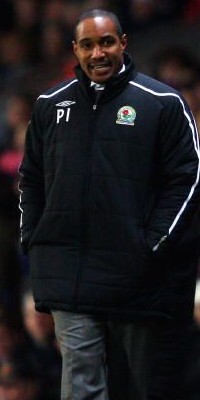|
Ince has long been marked out as a potential manager of the future. Unfortunately, this has always been for the wholly irrelevant fact that, like Roy Keane or Tony Adams, or Terry Butcher before them, he was a physically, imposing, domineering player. Ince's chief qualification for football management has been that he once played for England whilst oozing blood through a head-bandage.
Such characters have been natural captains of football teams since time began - partly because of their commanding presence and partly because they are rarely on the periphery of the action, regardless of their position - but it is a mistake to assume that on-field leadership translates to the altogether more cerebral and complex world of management.
Yet it is that personality, allied with a successful playing career, which provided Ince with his opportunity at Blackburn, because nothing else on his CV suggests he is the next Arsène Wenger or José Mourinho. He is certainly no student of the game, having conspicuously failed to obtain his coaching badges prior to plunging into management - and having done so without first serving an apprenticeship as a junior coach.
Only in this country do we identify potential top-flight managers by reference to such strange criteria, which ignore experience, knowledge and sheer intelligence in favour of less pertinent character traits. There is no one type of personality which succeeds in management: Sir Alex Ferguson, Rafael Benitez, Wenger and Mourinho are all of wildly different temperaments; indeed, those four examples, to which many others can be added, demonstrate amply that a glittering playing career is no pre-requisite for managerial success.
None were great players. Yet what their careers do demonstrate is the importance of dedication, of learning their craft and refining their methods away from the spotlight before implementing them at a higher level. Ferguson launched his career in semi-professional football at East Stirling - a world away from Aberdeen, let alone Manchester United - whilst both Wenger and Benitez coached in lowly places before moving on to better things.
And ironically, the man to whom the FA turned when it realised that this country is incapable of producing top-class managers, is perhaps the paradigm example of a career built slowly. Fabio Capello was a fine, international class player, yet he spent more than ten years coaching Milan's reserve and junior sides before being appointed as manager of that club.
Presumably, to have learnt the ropes whilst subservient to someone else would be at odds with Ince's view of himself as a supremo; no-one who nicknames themselves 'the guvnor' is especially prone to deference. But such narrow minded self-absorption is rarely found in the greats of the art. Even Mourinho, as he earned his living as an interpreter, was hoovering up information from Bobby Robson at Barcelona long before he proclaimed himself the 'Special One'.
Anyone who spent so long preparing himself for a top job in England would risk being dismissed as a career coach lacking the ambition or the toughness for a senior role. But Capello spent those years making a mockery of that very idea: instead, he absorbed the tactical and coaching ideas of those such as Ariggo Sachi under whom he worked, and he learnt how to manage people and how to mould a team to his philosophy. And so, when he finally emerged into the spotlight, he did so untainted by failure but with the assured authority of a man who had learnt his lessons and knew what he was doing.
It is that calm authority that the likes of Ince and Keane cannot match, because without those years of preparation, they do not really know what they are doing. Ince had barely 18 months in the lowest division of English football to familiarise himself with the role, of which the last 12 were spent in as favourable an environment as he could have wished for. Keane had nothing to draw upon at all. If Tony Adams proves a success at Portsmouth, it will be because he spent several years coaching at home and abroad under well-qualified coaches rather than his own horribly unsuccessful freshman stint at Wycombe Wanderers.
If English clubs do want to employ good quality English managers who can hold a candle to the best continual managers, then a change of attitude is required. Coaches who have done their time and learnt their trade must be given the opportunity to move into the top positions. Young managers who succeed in the lower divisions having spent a decade learning their trade must be given the chance to progress instead of being derided as 'small club specialists'. And those who deserve it must be given their head regardless of whether they spent their playing days as a callow winger at Rochdale or as a captain of Manchester United.
The travails of Keane and Ince have debunked the assumption that players of their ilk are natural managers. But if Blackburn Rovers should surrender to the blindingly obvious and find themselves searching for a new manager, then they should not stop persevering with former England internationals of modest experience just yet. I hear that Bryan Robson is available. So, come to think of it, is Chris Waddle.

